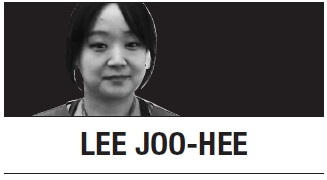
In our everyday drudgery of overwhelming duties and innate thirst for praise, it is easy to fall into the pit of spontaneous buck-passing when things go south.
And such a defensive mode quickly transpires into aggressive offense against the point of threat, plastered with the rationale of self-righteousness, when the stakes get higher.
In such a progression, it is easy to get lost in the tit-for-tat and all the emotions, with the direct parties and spectators losing grasp of what it was really all about.
And in many cases, those who are more eager to blow things up are usually those who feel more cornered.
Take, for an example, how the usual “How the (explicit) old are you anyway?” in street brawls between “ajeossi” is the older one’s devastating attempt to turn the fight into a seniority matter.
The clamor over newly minted Justice Minister Cho Kuk, his family’s alleged privileges and possible illegalities could be another, if not far more complicated, example.
As usual, discussion on Cho’s adequacy for the job itself is cloaked by the nitty-gritty allegations and counterattacks unabashedly thrown by the media to the pleasure of the power-hungry opposition and power-intoxicated ruling camp.
Sure, if he or his family members are found guilty of illegalities, he should not represent the country’s institution for justice. But then again, facts don’t really matter anymore.
In the business world, things often span the opposite way. While details shroud virtues in politics, politics can bury details in business.
The latest example is the confrontation between LG Chem and SK Innovation.
While the two firms had engaged in legal conflict before, this time the fight has become more intense, on the verge of becoming political.
The case began with LG Chem in April filing complaints with the US International Trade Commission and the District Court of Delaware accusing SK Innovation of poaching 76 engineers for its electric vehicle battery development. Filing the case at the US court was perceived as a show of confidence on LG Chem’s part as the legal proceedings in the US would require wider disclosures of evidence.
SK Innovation last month announced it is actually suing LG Chem for violating its patents on electric vehicle pouches, contending that the outnumbering patents of LG Chem are only larger in quantity rather than quality. LG Chem is counterattacking with its own set of patent suits against SK Innovation.
Amid the back-and-forth of multiple suits and statements, the two firms for the time being are reportedly arranging talks between their CEOs, possibly next week. Once LG Chem’s Shin Hak-cheol and SK Innovation’s Kim Jun meet, it is a coin toss between the confrontation fully blowing up or entering a cease-fire.
Why LG Chem chose this timing to raise the alleged job poaching by SK Innovation could always be questioned. And SK Innovation appears to have seized upon the timing’s vulnerability, immediately raising concerns that any type of dispute among Korean firms would hurt the country at a time of trade uncertainties and industrial challenges.
The frame made for convenient headlines for many news media outlets here, suggesting the suits would lower Korea’s battery prowess, already outpaced by China and being quickly chased by consortiums of European automakers.
Efforts to sway public opinion have reached a point where the issue could potentially become political, where in cases like these the expedient solution would be for the government to pressure the companies that all’s fair if it’s for the sake of the state.
But the problem is we have allowed our fear to override the essence too many times.
To exaggerate, many chaebol problems that we now face derive from the very same theory.
Yes, it is unfortunate that two key players in the promising field of electric vehicle batteries are locking horns. But that does not mean we should take things out of context. While facts may no longer be valid in politics, they should still be in technologies.
The reality is that the number of suits dealt with at the US ITC was 577 cases between 2009 and 2018. Raising a suit is increasingly being used as a tool by global businesses to have their rights protected and their technologies verified in the vicious tech competition.
LG Chem contends that in order to seize global competitiveness, protecting ones’ technologies is essential, even if it has to be against a local rival. SK Innovation says LG Chem is picking a fight in a desperate attempt to ward off threatening rivals.
Both may be right in terms of their motivations. But at the end of the day, a violation is a violation, and as long as they both believe in their innocence, it should be fair play of strict evidential review, free of smear campaigns or politicization.
The best men should be left to win.
Lee Joo-hee
Lee Joo-hee is the Business Desk editor at The Korea Herald. -- Ed.




![[Weekender] Korea's traditional sauce culture gains global recognition](http://res.heraldm.com/phpwas/restmb_idxmake.php?idx=644&simg=/content/image/2024/11/21/20241121050153_0.jpg)



